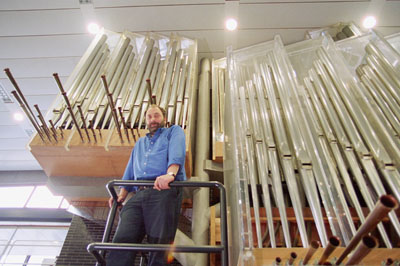Untitled Document
"Organ playing can get physical"
Spectacular techno and pipe organ concert
this Friday
During a recent introduction tour of TU/e, a new foreign
student asked if perhaps church services were held in the Auditorium.
An understandable assumption, with the big pipe organ towering
behind the lunch counter. But this instrument is used for concerts
and is some-times played during academic occasions. A free experimental
techno concert is planned for this Friday.
 "The concert promises to be
very spectacular. I'm told the people in the techno band are some
of the best in the field. And jazz organist Jasper van 't Hof
is specialised in crossover events of this kind", says prof.dr.ir.
Gerrit Kroesen, a plasma physicist and also chairman of the organ
committee.
"The concert promises to be
very spectacular. I'm told the people in the techno band are some
of the best in the field. And jazz organist Jasper van 't Hof
is specialised in crossover events of this kind", says prof.dr.ir.
Gerrit Kroesen, a plasma physicist and also chairman of the organ
committee.
Other musicians taking part in the concert are Janek Schaefer,
well-known in 'turntablism'; Guus Janssen, an award-winning improvisational
musician and composer; Stefan Robbers, famous for 'dansable' electronic
music and Maarten van der Put, a filmmaker especially interested
in the relationship between music and space. The event is the
last of a series of concerts entitled 'Orgel+' organised by the
Axes foundation and TU/e's organ committee.
Dry acoustics
TU/e's pipe organ was donated by Philips in the sixties with the
idea of improving the cultural content of the university. At the
time it was worth one million guilders, its current value is probably
more like four million. With 3745 pipes and 50 stops it is the
largest at any Dutch university. "We want to give this wonderful
in-strument more of a role in life on campus", says Kroesen.
The organ committee has appointed an official TU/e organist to
play at official occasions.
The acoustics of the Auditorium are the greatest challenge the
organ committee is facing. "The acoustics are very dry, which
means there is almost no echo, and it gets worse when the room
is full of people", he explains. "Some music is suited
to this type of environment, notably some of the more extreme
pieces, so we limit ourselves to that repertoire. Electronic adaptation
of the acoustics would give us a lot more scope, and even make
it possible to experiment with various echo techniques. However,
we will have to raise at least 100.000 guilders if we want this
done. We haven't got the money. But who knows, it might be a worthwhile
investment for an organisation doing acoustics research."
Passion
Talking to Kroesen, it's hard to imagine that anyone wouldn't
be fascinated by organ music. Over the years, it has become a
passion for him. "I've always listened to classical music,
but one day in 1977 I was really bowled over when I heard a music
student playing the Bach's Tocata in D. This is an impressive
piece often used in horror movies. Later on, after another great
concert in the Catherinakerk, I decided I would learn to play.
That was in 85, and it took me ten years to get to the level I
wanted. When I had learnt how to play without inadvertently damaging
the pipes, I was permitted to practise at TU/e. I can tell you
it was quite an experience and I put in quite a bit of overtime
at night. Sometimes I would play every evening after 11 p.m. Organ
playing can get quite physical, and it was often liberating to
make a lot of noise after a frustrating day."
Kroesen hasn't played much since he made professor last year.
"I like to spend the free time I have left with my young
son. But the pipe organ played a role on the occasion of my inaugural
speech in February 2001. There were about 400 people present,
and the music gave the whole event an extra dimension."
The physicist currently expresses his love of the instrument by
organising concerts that are as interesting and challenging as
he can make them. On one recent occasion an enormous bamboo wind
instrument, or Bambuso Sonoro, was constructed in the Auditorium.
The in-strument took up the space from the Blauwe Zaal steps to
the pipe organ, but there was room for seats to the side. "The
Bambuso Sonoro produced enough volume to allow a kind of 'dialogue'
with the pipe organ. It was exotic and beautiful", Kroesen
recalls.
Any musicians at TU/e interested in playing the pipe organ should
apply to the organ committee for permission. According to Kroesen,
it is good for the organ to be played as much as possible. However
the impressive noise it makes is not always welcome in a space
also used as a canteen and study hall. This is also why the Auditorium
does not have the cathedral acoustics suited to a pipe organ.
Organ playing is therefore limited to evenings and nights./.







